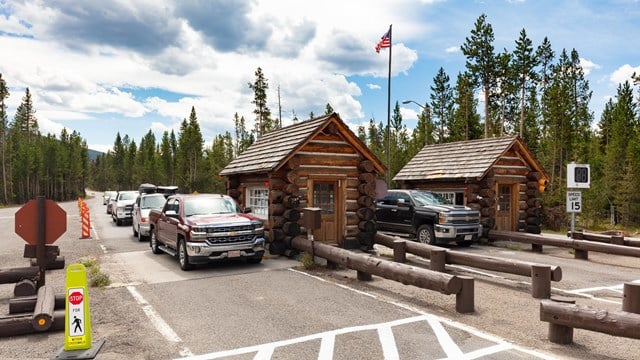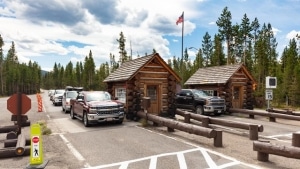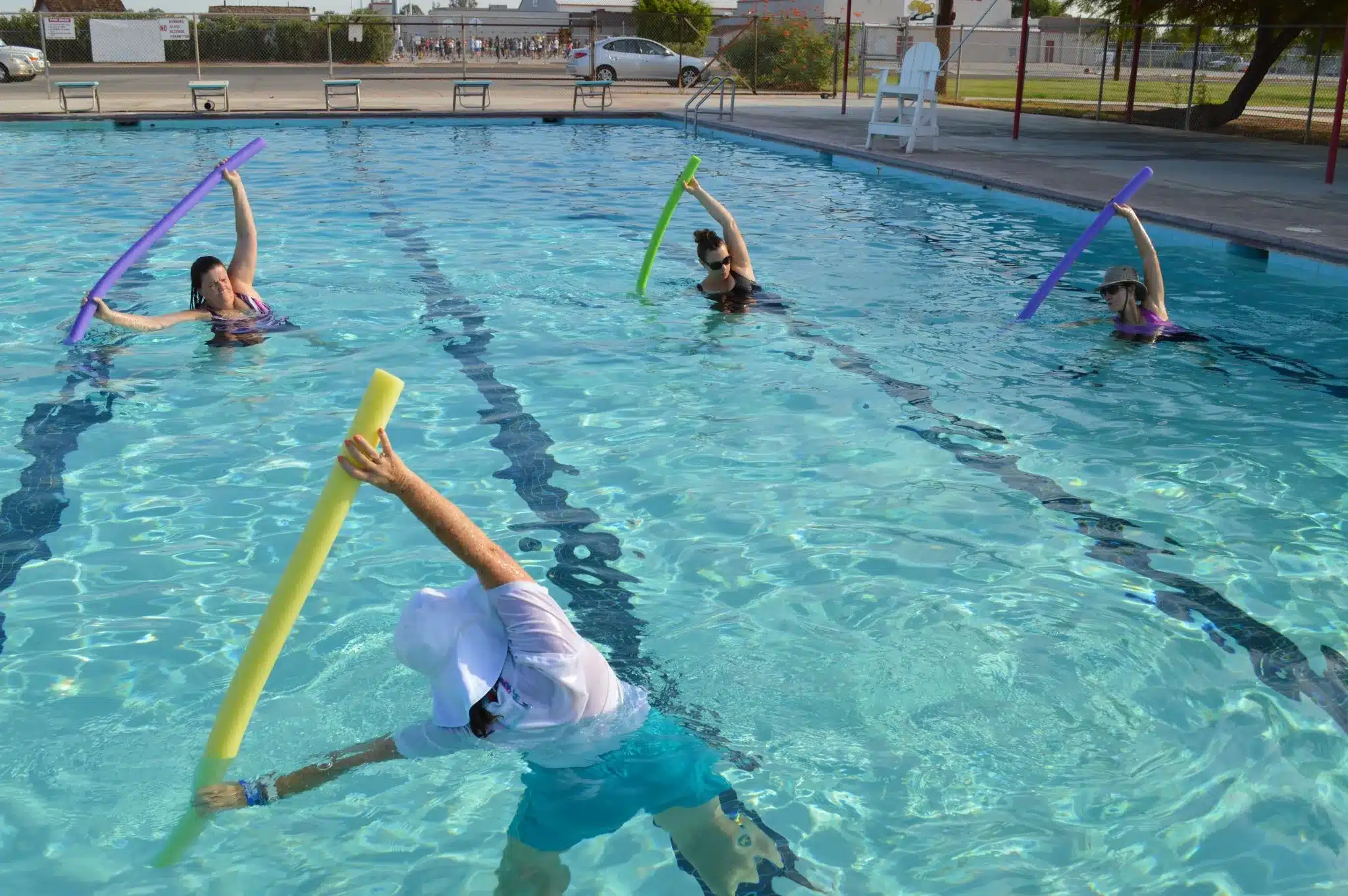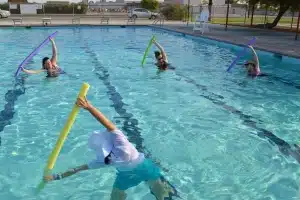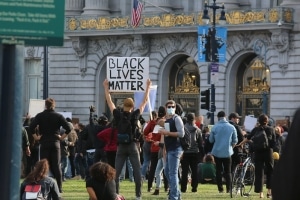
BLM Protest in San Francisco, 2020
Protesting Safer in America
It’s not looking good out there, and a lot of people in the coming months (and maybe years) will be taking the streets to show the government their displeasure. Protesting the Trump Administration is still legal, but there’s a lot you should know before you take your rights out for some exercise. You need a lot more than your funny sign ready before you head out for a protest.
First and foremost, you need to have a plan. Are you staying for the whole thing, even if it goes into the night? Are you there to show off your funny sign, take pictures, confront the police, or just vote with your body, to tell the Trump administration you don’t like what they’re doing? Do you want to keep people you care about safe while they attend? Or are you there to put your body on the line, come what may?

Occupy Wall Street protest camp in DC.
There’s a lot of different roles and ways to participate in a protest. I’ve been to dozens across three continent, usually in the role of journalist. But I’ve also protested, and even helped with organizing a few events. This will be a few lessons learned about attending and understanding protests. It is focused on American protests. In a practical sense what makes a protest American is American police and American laws. However, local laws on assemblies vary, as do local police cultures. If you don’t know how these factors work where you will be protesting, ask a local.
There are different roles for people at a protest, and they require different equipment and preparation.
Attendees
Bring with you:
- water (not cola or sugary drink — really, just water in a refillable non-glass bottle)
- friend or lawyer’s number, preferably written on your body in marker
- snacks, for yourself and to give away
- USB batteries and cables for your cell phone, and better yet, bring enough to share charging with others
- saline eye wash
- earplugs
- if you wear contact lens, you should switch to glasses, or at least have them with you
- good shoes you can wear for days.
Maybe bring:
- a mask/respirator
- a camera
- goggles
These items can make you a target, but they can also be invaluable for dealing with violence or chemical agents. Masks can be useful for both not catching diseases and reducing the effects of less lethals like tear gas and pepperspray. This is one of the reasons they’re often illegal at protests, as well as making it marginally harder to identify protestors. I still bring one every time, but I try to keep them non-threatening. A cloth mask with a filter will not draw as much negative attention as a respirator or a gas mask, but will perform nearly as well.
Do not ever bring with you:
- your only form of ID
- anything you can’t afford to lose
- prescription medications
- drugs, recreational or not.
- weapons or other illegal items (with the possible exception of masks)

French protests against pension reform
Back up the data from any electronic devices you bring, and turn off face ID, fingerprint recognition, or anyway you could be physically compelled to hand over your data. Come up with a long passcode, and if you’re worried about forgetting it, write it down somewhere at home that only yourself and maybe your loved ones can access.
If you’re coordinating with people, make like the Houthi PC small group and create a Signal chat. (Don’t invite anyone from the Atlantic, they’re busy.)
Risky things to bring:
- spray paint
- canes, other assistive equipment
- anything an unreasonable police officer could construe as a weapon
- black clothing
Know where to find your people: pick a designated spot to meet up if you get separated. If phones fail or are lost or taken, make sure everyone knows where to go to meet up again.
A Few Observations for Organizers
I haven’t been a protest organizer myself, but I have talked to a lot of organizers over the years. Here’s a few novel things I’ve learned:
- Have your messaging worked out and ready. When a journalist or a neighbor shows up, be ready to explain the plan and the goal of your protest. Don’t be cute or ambiguous, even if you’ve given your protest an extremely cute name. Everything should have times and dates, whether you’re posting to Facebook or flyering. Don’t use a relative date, like “Next Saturday.” Give a day, time, location, and if you’re really kind, the year. (I have seen people show up for a protest a year late.)
- Get to know your street medics. Many of them are medical professionals or volunteers in their normal life. Whether they think of themselves as there to protest or not, their first priority is to intervene before there’s serious injury, or in the worst case to administer first aid while waiting on an ambulance. They also might be handing out granola bars and water to tired or kettled protestors. These are the people you are most likely to be looking for, or are looking for you, by the time your protest is entering the turn from family gathering to unintended street battle.
- If it’s a large protest, designate a deescalation/intervention crew. Give them vests or something to ID them. This is especially true for long protests or particularly stressful circumstances. These are people who can intervene in conflicts or meltdowns, and potentially transfer cases to the medics or even standard emergency services if needed. Mostly though, they will be talking people down, getting them water, and potentially giving people who need it the permission to leave the protest.
- Learn how to use, and teach, the people’s mic. You may not think that you need this technique, and you may be right. But if things go sideways, it’s the last and most reliable way to coordinate with a crowd.
- Figure out a plan for how you either end your event, or let it transition to a rowdier protest after dark. You definitely know more about your local municipality than I do, and more about the crowd. You aren’t going to have as much control on the night crowd as you do on the day crowd, but you do have some power over the formal end of the event, and the character of that moment can effect how the wilder night protest goes. If you march people to the police headquarters at dusk and walk away, you’re communicating something very different to your people than if you end at a party in a commercial district with bars and restaurants.
The Folks You Meet at a Protest
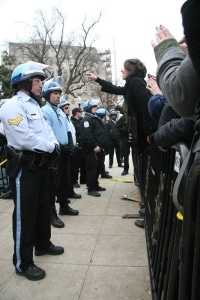
More Occupy Wall Street
The Protestors
These are people who probably on the whole agree with you. Most people at a protest are doing casual civic duty. They have made a funny sign, or knit a hat, and are dabbling in a bit of the democratic freedom to assemble. The US is a country that sadly enough ignores protests without paying much of a political price for that neglect. But there are times when protest can shake the political order of any nation, even our own. As a protestor or activist, you never know what kind of movement you’re in until years later, when it’s enshrined in the history books.
Some people just want to be where the action is at, or be part of an occasion. Some are doing a bit of what they consider their duty as a citizen. Some of the people in the crowd went out for a walk and ended up joining the crowd because it looked fun. A few are long time activists, people who have devoted their lives to moving the needle in the direction of justice, however they see it. A few are just the old guys who show up to everything.
Counterprotestors
Counterprotestors are usually a group of agitators who group together and harass or threaten the protestors. Usually they are best ignored, though they can become dangerously obnoxious. In some places, you can just point them out to the police if they get violent. In other places the group will take care of them, for better or worse. If local cops are trying to pull them out of a hostile crowd before they get beaten down, just steer clear of it. I have never seen a situation where sufficiently obnoxious counterprotestors didn’t eventually get sorted out by the natural order of things. But people can and do get hurt.
Legal Observers
The people in the florescent green hats are volunteers from the NLG – National Lawyers Guild. If someone has been pulled out of the crowd or detained by police, they’re the first people you can tell about it. Better yet if you can give them a photo of the arrest, and any other information you know about the detained person or persons. They can’t take action directly against police or counterprotestor violence, but they know some lawyers. If someone is being assaulted or arrested, it’s good to document it. Police can’t stop you from documenting it legally, but they might try to anyway. Usually backing up calms them down.
The Blackbloc/Antifa

A lot has been made of the terrifying evils of Antifa by Republicans. But “Antifa” is just short for Anti-fascist. I’ve never minded the idea of people being antifascist, but that’s become a more controversial position than I ever thought it would be.
The Antifa kids generally dress in black (hence Blackbloc) and stay together. They tend to be younger and whiter than most of the crowd. There’s good reasons for this — they are most likely to be involved in physical violence with the police, and being fit and white helps in not getting arrested or killed as much. Antifa may get into physical fights with the police. They will also be the people de-arresting other protestors the police are trying to take into custody.
Whether you agree with de-arresting or not, don’t get into the middle of it. Very few good things happen to you when you get between a 19-year-old with daddy issues and a baton, and a 35-year-old cop with daddy issues and a taser.
The Police

Occupy Gezi anniversary protest in Istanbul.
Law enforcement are nervous at protests. This is a universal, unless they outnumber the protestors. They are not used to being outnumbered or potentially outgunned, but they have to assume both at large protests. Ironically this is especially true in more gun friendly states. I recommend being polite and professional with them in person. Rarely is anything gained by being verbally confrontational, unless you’re a lawyer trying to get your client back from custody.
Police at a protest are never there to keep you safe. They are there mainly to protect property, and to disperse the crowd as soon as it is feasible to do so. If you need help, medical care, etc., don’t ask the police. They have neither the time nor inclination to help you. If someone is injured, find the protest’s medics. If the problem is severe enough, try to let an organizer know, or call 911 for an ambulance. It’s not impossible for the police at a protest to take care of an injured protestor, but it is exceedingly rare in my experience. A protestor is more likely to be arrested/detained than given treatment, even if the protestor is visibly injured or bleeding.
I’m going to repeat this, because people have a hard time understanding this: the remit of police at a protest is protect (mainly) commercial property, and to disperse the crowd as soon as it is feasible to do so. The police are not there for your health or safety. They will move in if they think someone is going to break the window of a Starbucks, but not if someone in the protest is injured.
The police will also have some terrible toys at their disposal. It’s likely that the speaker system the police are using at a protest is an LRAD or Long Range Acoustic Device. They both work as a speaker and as a weapon that can disperse a small crowd with painful noise. LRADs don’t work well to disperse large crowds, but they can drive away smaller crowds or groups that the police have divided up from the main protests. They will have chemical and less lethal munitions, as well as lethal weapons. They don’t want to use the lethal weapons — that’s a lot of paperwork. But they will use less lethals more quickly and indiscriminately than a normal person would find reasonable. Make your decisions about where to be and what to do in the protest with the understanding that the police are dangerous.
Police Kettling
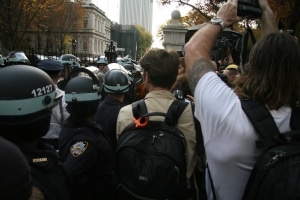
A kettle near Zuccotti Park, during the OWS eviction. You really are right on top of each other.
Kettling is when the police block and surround a group of people, usually a smaller group within a larger protest, and don’t let them out. Sometimes they tighten in on the kettle to force people into a clump and either arrest or beat them. If you find yourself in a kettle, keep moving. I was once in a kettle for over five hours in New York, everyone in it walked around Zucotti Park for hours, because you don’t want to stop moving in a kettle. It makes you more vulnerable to arrest or beating.
The police will beat people, and the longer a protest goes on, the more tired and violent the police will become.
Protests After Nightfall

French pension reform protestor in front of a literal trashfire.
The kids and the pissed off old ladies tend to go home by sunset. Protests change character at that point, with more Black Bloc and sometimes running street battles with the police. This is generally a bit one sided, since some protestors may have brought some brass knuckles and spray paint, but the police have brought leftover gear from the wars in Iraq and Afghanistan.
It’s important to know the longer a protest goes on, the more likely the police will use less lethal weapons on everyone around them. There are good reasons to stay through the night and not cede ground to the police, like protecting someone or something, but it’s not easy.
You are always safer near a television news camera crew. It’s not perfect, but since Rodney King got beaten in Los Angeles, the police have been nervous about being filmed.
Once the mood has turned, and you’re in a kinetic situation with police and protestors clashing you have to think tactically:
– Know your egress points.. what does the map look like? Are the exiting streets blocked by police? Where are the police, where is their equipment? (What kind of gear they bring to the protest tells you what kind of protest they’re expecting and what they’re prepared to do about it.)
– For organizers or people shepherding a more kinetic protest, do you have eyes on the police? Do you have eyes on your the edge of your own protest? Will you know if arrests start? Will you be able to get to people if arrests or violence starts? What is your policy on dearresting?
When do you tell people who can’t afford to be arrested to leave the area? What is the is the trigger for that call to go out?
These are all things to think about as both an organizer or protestor before you’re in the situation.
The larger and more complex protests become, the larger and more complex managing the situation becomes. Police can set up rogue cell towers to intercept phones contacting the telecom infrastructure. Other people can detect those towers with a backpack of electronics and an antenna — but there’s not much you can do to stop official traffic sniffing.
If cell access is cut altogether, do you have some kind of back up?
Do you have a plan for jail support? Being there can mean the world for people in custody. Do you have a bail fund? Do you know lawyers willing to work pro bono for jailed protestors without any money?
The sad fact is this: if protest becomes effective, governments tend to react with extreme violence and rights abuses.
Protesting has Range
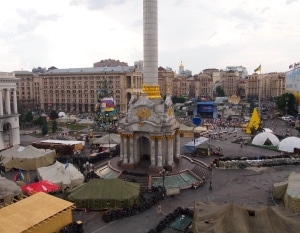
The protest camp at Euromaidan in Kyiv, after Yanokovich fled to Russia.
On one end of the spectrum, protests can be a fun walk in the park with witty signs and fun community. But they can go all the way to occupying government buildings, defending encampments from military, and deposing leaders who flee the country, like Viktor Yanukovych did in Ukraine in 2014.
I hope nothing like that is needed in America. We are not used to that kind of political fight, and I am not sure we are up for it. But it seems not beyond the realm of possibility in a country where people are already being disappeared for their speech.
My last piece of advice for a protest is simply to notice carefully what’s around you. What’s in the air? Where is this going? What might my political context ask of me, and what am I willing to give? No one can answer this but you, but when the time comes, you will know your answer.

